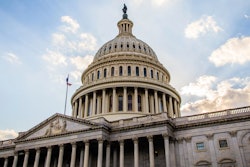When alumni of Concordia College in Selma, Ala., converged in late June on the school for their annual gathering, an enthusiastic round of cheers erupted at the group’s closing banquet as university President Rev. Dr. Tilahun M. Mendedo formally announced the Southern Association of Colleges and Schools (SACS) had removed Concordia from “probation” status after approximately two years and given it a clean bill of health.
“Everyone was ecstatic and pleased,” recalls Phyllis Richardson, director of Concordia’s freshman transitional programs.
The good news capped what many involved described as a gut wrenching three years of uncertainty at Concordia, a small Lutheran Church-Missouri Synod supported college in the middle of Alabama’s Baptist dominated Black Belt.
During that time Concordia saw enrollment nosedive, its historic good credit standing vanish as it began to accumulate a deficit nearing $1 million, fundraising grind nearly to a halt, relations fray between veteran staffers at the school and an interim administration, and SACS placing the school on “probation” after citing more than 30 instances in which Concordia failed to comply with the agency’s accrediting standards.
The ordeal also forced Concordia’s leaders to get on with selection of a permanent president to replace the Rev. Dr. Julius Jenkins. A widely admired administrator, fundraiser and recruiter for the school, Jenkins retired in 2007 after 27 years at its helm. A permanent president was appointed 18 months ago. The probation circumstances also forced the school to rethink its business plan, one that ensured all students got enough money for tuition and other costs to graduate debt free. It doesn’t do that any more.
Most importantly, officials said, the ultimate solution for getting the school out of trouble was a decision to get the school leadership team on the same page at the same time, involving them more in the process of addressing and solving the school’s problems, a practice many say had been lost during the leadership transition years.
“It was a bad situation, but you can turn a bad situation around,” says Kevin Stewart, vice president for development at Concordia Selma, the only historically Black college in the 10-school Concordia University System.
“You shouldn’t get ready for SACS; it should be your normal practice,” says Stewart, recruited by Concordia last fall to help the school prepare for what was largely felt would be the school’s last good chance to avoid harsher penalties by SACS that could possibly doom the institution.
Accreditation isn’t necessarily hard, if worked on constantly, Stewart says. It does require a significant amount of work on seemingly unimportant details, however, as well as big-picture items such as financial viability and controls. At one point or another during its transition time, Concordia was missing the mark on one point or another, he says.
Stewart, who had worked with several schools in the past on their SACS compliance challenges, notes that Concordia had made a lot of progress addressing SACS issues that could have been addressed immediately after it was placed on probation two years ago.
While Concordia had succeeded in whittling down the SACS findings of non-compliance to two items by the time he came on board last November from 33 when it was placed on “probation,” the school still needed to address SACS questions about financial stability and viability, the “core” standards questions. His suggestion of team work seemed relatively simple.
“When I came here they (school administrators) were not meeting as a group,” Stewart recalls.
Immediately after attending the SACS meeting in December 2010 and getting a better grasp of how steep a hill Concordia still had to climb to clear its reputation, Stewart began holding meetings of “all key stakeholders –- weekly.
“We had a good institutional effectiveness process in place; it just needed to be used,” says Stewart, who acknowledges some colleagues jokingly referred to him as “the general.”
“That was a key step,” he said, “that we all took part.”
Getting the school back in good standing with SACS was “everybody’s quest,” he says. “The staff was mad,” Stewart says of the endless meetings and demand for detail after detail and plan after plan. “But it was important.”
The homestretch between last December and this spring found Stewart briefly in charge of the day-to-day operations of the school last winter so Mendedo, could go on the road to make personal appeals with potential donors to help the school clear its immediate and long-term financial hurdles. Mendedo, a rookie school president, is a seasoned fundraiser from his days of traveling from his native Ethiopia to Europe raising funds for Lutheran mission schools in Ethiopia and anti-malaria campaigns.
Between December and June, Concordia raised close to $1 million, including approximately $25,000 raised at an April alumni dinner, the alumni group’s first $100-a-plate dinner in a region where $25 dinners are considered pricey.
“I believe in team leadership,” Mendedo says. Being school president “… isn’t something I boast for, ‘I’m me, I’m president.’ Quality of good leadership is the place functions well without you,” he says.
At the alumni dinner, where Mendedo formally announced the school’s big news, were California builder Ross Edwards and his wife, Gloria, both active in the Lutheran Church.
Last year, Edwards had been persuaded by Lloyd Probasco, a Nebraska businessman who was vice chairman of Concordia’s Board of Regents, to give Mendedo five minutes to make a case for Edwards helping Concordia. The pitch worked and Edwards became a solid backer of the Selma school. At last month’s alumni dinner, Edwards was honored for his relentless support of the school.
With the SACS scare behind it and some harsh lessons learned, the Concordia Selma team says it’s more ready now than ever to navigate the roads ahead. With the “probation” stigma behind it, Concordia is readying for a 10 percent boost in enrollment this fall from its most recent enrollment count of approximately 653. It had been as high as 900. The school is also putting the final pieces in place for a multi-million capital campaign to be launched this fall.















